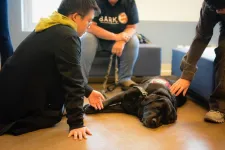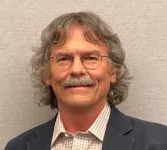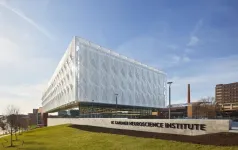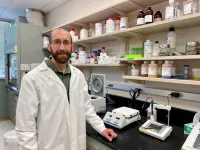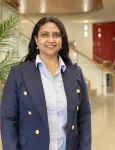(Press-News.org) A team of scientists at Rochester Institute of Technology will expand its work after receiving a large grant from the National Science Foundation to make chemistry more accessible for students who rely on American Sign Language interpreters in class.
Christina Goudreau Collison, professor in the School of Chemistry and Materials Science; Jennifer Swartzenberg, senior lecturer in the National Technical Institute for the Deaf’s Department of Science and Mathematics; Lea Michel, professor in the School of Chemistry and Materials Science; and Pepsi Holmquist, visiting assistant professor in NTID’s Department of Science and Mathematics, have been awarded nearly $380,000 for their proposal to transform chemistry for deaf and hard-of-hearing students via the design, implementation, and evaluation of a descriptive sign language lexicon.
The work started years ago when Swartzenberg was learning ASL. When she visited classrooms, she noticed that interpreters had to do a lot of fingerspelling to communicate technical terms. Upon further investigation, Swartzenberg realized that deaf students’ grades were lower than the hearing students’, indicating a language barrier. Swartzenberg had taken Goudreau Collison’s classes in the past and was familiar with how she used body movements to help explain terms. The pair decided to work together to find a solution.
A group was formed and the initial work began. A team worked to identify organic chemistry terms, and a process evolved where deaf students created signs in collaboration with Goudreau Collison and Swartzenberg to ensure they had scientific clarity. Once they agreed on the signs, other ASL users reviewed them, and videos were created that taught the chemistry-specific signs.
Now, years after the initial implementation, there is evidence supporting the effectiveness of their efforts. Tracking one specific exam in her class, Goudreau Collison found that prior to the group’s work, deaf students were scoring below the class average. After creating and teaching the new chemistry signs, working with interpreters, and creating peer-led workshops, interpreter-dependent students were now performing above exam average.
The strategic methodology of establishing the new signs with input from students, scientists, and interpreters has proven beneficial for all and made the initial project successful.
“The signs need to be descriptive and help to understand the concept in addition to just telling what the word is,” said Goudreau Collison. “That’s where the collaboration comes in, because you really need the content and the understanding of the meaning behind the word, as well as the understanding of how a sign is going to work best for all students.”
With the NSF grant, the scientists will continue the work in completing a comprehensive set of STEM signs for concepts and terms in general chemistry and biochemistry.
“This project is something that is incredibly complicated,” said Holmquist, who is deaf. “Going into the nuance and details of general chemistry and biochemistry, it can be very challenging to come up with an iconic sign that’s going to include all of the overlapping ideas that show up in our vocabulary with minimal loss in translation between English and sign language.”
To illustrate the complexity of this project and how difficult it may be to choose a suitable sign for a concept, Holmquist explained that the sign for electron is also a sign that she uses for monomer. In science, these two things have very different meanings. For students using sign language in science classes, whether the professor is referring to an electron or a monomer is crucial for the student to fully understand the lesson.
“We’re trying to look at areas where language overlaps and take that into consideration,” added Holmquist. “The goal is to minimize confusion. Sometimes you can’t use just one sign for one concept and be done with it. You need to have a selection of two or three signs for that concept.”
Goudreau Collison and Swartzenberg led the initial research team (named the Sign Language Incorporation in Chemistry Education [SLICE]), and recruited Michel and Holmquist to expand the project. The SLICE team was recognized in June 2022 with the Royal Society of Chemistry’s Inclusion and Diversity Prize.
The work doesn’t stop when terms are identified and signs are chosen. The team plans to disseminate the new lexicon to deaf and hard-of-hearing students as well as to interpreters and chemistry faculty. In the future, the researchers plan to have workshops for faculty, staff, and interpreters to show the signs and their usefulness.
“I think it’s the key to learning for everybody,” said Goudreau Collison. “Sign language has universal design opportunities that can be leveraged for accessibility for many more learners of chemistry, for example, English as a Second language (ESL) students and other neurodiverse learners. I think it’s going to help a lot of people in many ways.”
Furthermore, giving deaf and hard-of-hearing students accessibility to science, in general, opens more doors for students to get involved in STEM programs and careers. Professors involved in the study have already seen an increase in deaf students in their research labs.
“This project is so exciting for me,” said Holmquist. “I know it’s going to make a huge difference and give deaf people options that they didn’t even know they have. I didn’t think it was possible for me to go to graduate school, so it’s really nice that now I’m in a privileged position right now to empower other people. We are able to inspire the next generation.”
END
RIT scientists receive grant to expand work on a sign language lexicon for chemistry
A team of four scientists is working to make chemistry more accessible for deaf and hard-of-hearing students
2023-10-30
ELSE PRESS RELEASES FROM THIS DATE:
Canine cuddles can comfort equally across all genders
2023-10-30
While there are a number of studies demonstrating that dog therapy programs can improve a person’s social and emotional wellbeing, many typically have a disproportionate number of female participants.
Recent research led by Dr. John-Tyler Binfet, an Associate Professor in UBC Okanagan’s School of Education and Director of Building Academic Retention through K9s (BARK), evaluated if there are gender differences in wellbeing by setting up separate dog therapy sessions for those who identified as female, male and gender diverse participants.
Dr. Binfet has conducted numerous studies on the benefits of canine therapy, but to his knowledge, ...
Protein eIF4A emerges as a potential Achilles’ heel for triple-negative breast cancer
2023-10-30
Improving treatments for triple-negative breast cancer (TNBC), an aggressive tumor with very poor prognosis and limited therapeutic targets, has been challenging. Responding to this need for better treatments, researchers at Baylor College of Medicine and collaborating institutions have investigated potential vulnerabilities in TNBC that could lead to novel therapies and improved outcomes for this devastating condition.
The team reports in The Journal of Clinical Investigation that in diverse TNBC animal models, targeting protein eIF4A with the ...
Novel Rett syndrome variant shines light on new screening strategies for therapies
2023-10-30
Rett syndrome is a rare devastating neurological disorder that primarily affects young girls and manifests as an impaired ability to walk and talk, along with characteristic ‘hand-wringing’ movements, seizures, and cognitive disability. This incurable condition results from mutations in the methyl-CpG binding protein 2 (MECP2) gene that impairs the role of the MeCP2 protein in regulating the activity of many genes in brain cells.
A new MECP2 gene variant (G118E) was recently characterized by a research team led by Dr. Huda Zoghbi, a distinguished service professor at Baylor College of Medicine and the founding director of the Jan and Dan Duncan Neurological ...
Optica Publishing Group launches new Gold Open Access Journal, Optica Quantum
2023-10-30
WASHINGTON—Optica Publishing Group today published the first issue of its newest peer-reviewed, Gold Open Access journal, Optica Quantum. Optica Quantum joins Optica Publishing Group’s diverse portfolio of 19 peer-reviewed journals and provides a home for high-impact research in quantum information science and technology (QIST), enabled by optics and photonics. Editor-in-Chief Michael G. Raymer of the University of Oregon, USA, leads the editorial board, comprised of outstanding researchers from around the world who are active in quantum science and technology.
“Discoveries in QIST have the potential to change the world ...
Just in time for Halloween: Researchers document the power of 'ghostly encounters' on organizations
2023-10-30
Brigham Young University researcher Jeff Bednar is now a part-time ghost hunter. And while the business professor doesn’t have night vision cameras or ultrasensitive recording equipment, he’s found a bunch of ghosts — including several on his own campus.
The ghosts Bednar and University of Illinois colleague Jacob Brown are hunting sound similar to the ghosts you’ve heard of — they linger long after they’ve left this life and hover over their previous haunts — but they’re not necessarily the kind of ghosts that show up around Halloween.
They’re called organizational ghosts: admired former ...
University of Cincinnati's UC Gardner Neuroscience Institute will continue to oversee U.S. NIH-funded stroke trials
2023-10-30
UC, UC Health mark 10 years as NIH StrokeNet National Coordinating Center, celebrate competitive renewal for next 5 years
Cincinnati, OH (Monday, Oct. 30, 2023) – The University of Cincinnati and UC Health have been renewed as the National Coordinating Center of the National Institutes of Health (NIH) StrokeNet, which is the primary infrastructure for multicenter trials of stroke funded by NIH and the pipeline for new potential treatments for adults and children with stroke and those at risk for stroke.
Created in 2013, NIH StrokeNet ...
ACC Middle East & Eastern Mediterranean 2023 Conference highlights evidence-based strategies, contemporary best practices for improving heart health
2023-10-30
The American College of Cardiology (ACC) and the Hellenic Society of Cardiology have teamed up to host the ACC Middle East & Eastern Mediterranean 2023 conference. The annual forum kicks off on November 3 – 5 in Athens, Greece, and puts the spotlight on the latest in cardiovascular prevention.
Global experts will converge for an innovative educational experience to discuss best practices for improving the heart health of patients with cardiovascular disease. Cardiovascular disease is the leading cause of death in the world. There are an estimated 11 million new cases of heart disease in Europe each year, while cardiovascular diseases are responsible for one-third of ...
Specific gut bacteria increase risk of severe malaria
2023-10-30
INDIANAPOLIS—Indiana University School of Medicine researchers have identified multiple species of bacteria that, when present in the gut, are linked to an increased risk of developing severe malaria in humans and mice. Their findings, recently published in Nature Communications, could lead to the development of new approaches targeting gut bacteria to prevent severe malaria and associated deaths.
Malaria is a life-threatening infectious disease caused by parasites transmitted through the bite of infected mosquitoes. According to the World Health Organization’s latest World Malaria Report, an estimated 619,000 people died from malaria ...
University of Oklahoma engineer awarded NIH grant to design algorithms for studying cancer initiation
2023-10-30
Marmar Moussa, Ph.D., an assistant professor of computer science professor at the University of Oklahoma, has secured a nearly $1 million award from the National Institutes of Health to advance her work in computational genomics.
The study, titled “Computational approaches to the mechanistic elucidation of the serrated pathway of human colon carcinogenesis,” aims to unravel the mechanisms driving the serrated pathway of human colon carcinogenesis using computational methods that help explain how colon cancer develops.
“This research is ...
Offset markets: New approach could help save tropical forests by restoring faith in carbon credits
2023-10-30
A new approach to valuing the carbon storage potential of natural habitats aims to help restore faith in offset schemes, by enabling investors to directly compare carbon credit pricing across a wide range of projects.
Current valuation methods for forest conservation projects have come under heavy scrutiny, leading to a crisis of confidence in carbon markets. This is hampering efforts to offset unavoidable carbon footprints, mitigate climate change, and scale up urgently needed investment in tropical forest conservation.
Measuring the value of carbon storage is not easy. Recent research revealed that as little as 6% of carbon credits ...
LAST 30 PRESS RELEASES:
Alkali cation effects in electrochemical carbon dioxide reduction
Test platforms for charging wireless cars now fit on a bench
$3 million NIH grant funds national study of Medicare Advantage’s benefit expansion into social supports
Amplified Sciences achieves CAP accreditation for cutting-edge diagnostic lab
Fred Hutch announces 12 recipients of the annual Harold M. Weintraub Graduate Student Award
Native forest litter helps rebuild soil life in post-mining landscapes
Mountain soils in arid regions may emit more greenhouse gas as climate shifts, new study finds
Pairing biochar with other soil amendments could unlock stronger gains in soil health
Why do we get a skip in our step when we’re happy? Thank dopamine
UC Irvine scientists uncover cellular mechanism behind muscle repair
Platform to map living brain noninvasively takes next big step
Stress-testing the Cascadia Subduction Zone reveals variability that could impact how earthquakes spread
We may be underestimating the true carbon cost of northern wildfires
Blood test predicts which bladder cancer patients may safely skip surgery
Kennesaw State's Vijay Anand honored as National Academy of Inventors Senior Member
Recovery from whaling reveals the role of age in Humpback reproduction
Can the canny tick help prevent disease like MS and cancer?
Newcomer children show lower rates of emergency department use for non‑urgent conditions, study finds
Cognitive and neuropsychiatric function in former American football players
From trash to climate tech: rubber gloves find new life as carbon capturers materials
A step towards needed treatments for hantaviruses in new molecular map
Boys are more motivated, while girls are more compassionate?
Study identifies opposing roles for IL6 and IL6R in long-term mortality
AI accurately spots medical disorder from privacy-conscious hand images
Transient Pauli blocking for broadband ultrafast optical switching
Political polarization can spur CO2 emissions, stymie climate action
Researchers develop new strategy for improving inverted perovskite solar cells
Yes! The role of YAP and CTGF as potential therapeutic targets for preventing severe liver disease
Pancreatic cancer may begin hiding from the immune system earlier than we thought
Robotic wing inspired by nature delivers leap in underwater stability
[Press-News.org] RIT scientists receive grant to expand work on a sign language lexicon for chemistryA team of four scientists is working to make chemistry more accessible for deaf and hard-of-hearing students
